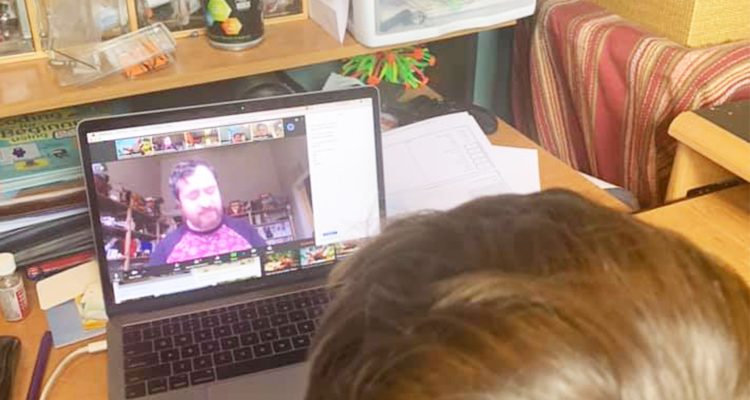Following state officials from around the country, West Virginia’s governor Jim Justice closed all West Virginia public schools on Friday, March 13.
Although our state’s teachers had spent time preparing for this temporary closure by assembling take-home learning packets for their students, this mandate left them and the tens of thousands of students and parents they serve grappling with uncertainty. Preparing and distributing weekly paper packets for more than 280,000 K-12 students throughout the state is not sustainable over the long-term.
Thankfully, technology offers a way to keep the learning going online.

COMING TOGETHER ONLINE
Here in Ohio County, public school teachers have been working hard on moving their courses from face-to-face classroom experiences to virtual learning. Ryan Stanton, a history teacher from Wheeling Park High School, is helping his students understand the current crisis by looking at the way the people of Wheeling have handled past hardships, including the historic 1936 flood.
Stanton says that his students regularly use an online learning management system called Schoology, which has made the transition easier for both students and teachers. Nonetheless, everyone is facing a learning curve of one kind or another.
In fact, according to Stanton, the faculty have been meeting in small groups to discuss different programs and teaching strategies, such as Screencastify, which allows instructors to create instructional videos to share with their students.
Like in previous times of trouble, West Virginia teachers have come together in multiple ways to support each other and the communities they serve. In fact, many teachers throughout the state were sharing messages like this one from Ohio County innovation coach Gail Adams on Facebook and other social media outlets:
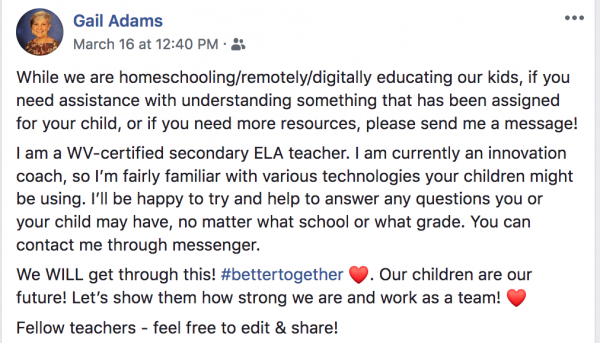
As always, however, the teachers weren’t alone in encouraging a team effort. School staff and bus drivers came together to assemble and distribute meals to students. Given that one in five West Virginia children struggle with hunger in their homes, school closures mean missed meals. Therefore, ensuring children have regular access to food is imperative and school staff members make it possible Monday through Friday through deliveries at bus stops and pick-ups at schools throughout the state.
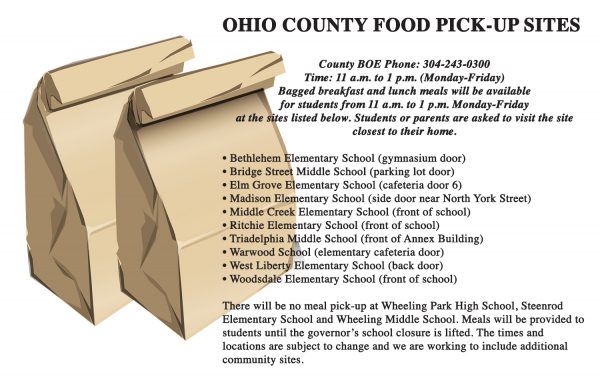
DARK CLOUDS OVER VIRTUAL UTOPIA
Nonetheless, the complexities of teaching online are many, especially here in West Virginia. Residents of many rural communities do not have access to the internet to keep their children connected. In fact, even teachers right here in Ohio County do not have high-speed internet in their homes requiring them to connect via cell phone hotspots, which is an added cost on most data plans.
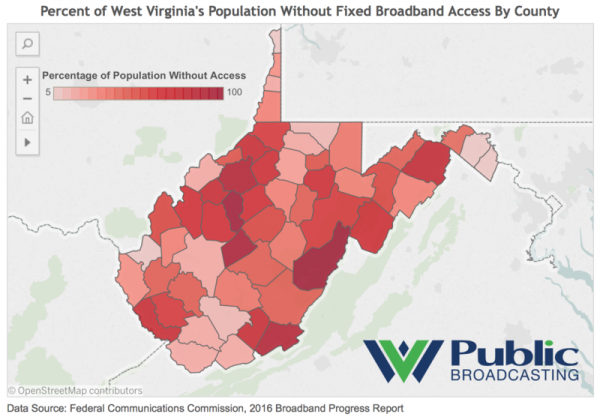
Schools have attempted to remedy access issues by loaning students Chromebooks, iPads and other portable electronic devices, but even that solution is only viable if wifi access is available. Although some providers have offered free internet to low-income families during the duration of this home confinement, if communities do not have the hardware necessary to connect to the hub, it won’t make a difference.
In addition to internet access, schools being closed has presented other roadblocks. Parents, many of whom are facing issues with employment because of workplace shutdowns, find themselves both scrambling for money to feed their families and working with their children to complete their coursework and stay connected to their peers. In addition, the current situation is challenging for parents whose jobs are still open as they have trouble finding childcare for children who would have otherwise been in school all day.
All of these difficulties have been identified by West Virginia educators and state officials. Attempts are being made to address them on a one-on-one basis, including teachers offering to drop off and pick up homework from students who cannot interact online.
For the most part, students of Ohio County seem to be handling the shift to virtual schooling well. Social media has been flooded with photos of children “doing school” at home on their electronic devices as well as playing outside in the warm spring weather. Even though many of them relish this new measure of freedom, high school seniors are not reveling in potentially missing long-awaited rituals like prom and graduation.
ESTABLISHING A SENSE OF NORMALCY
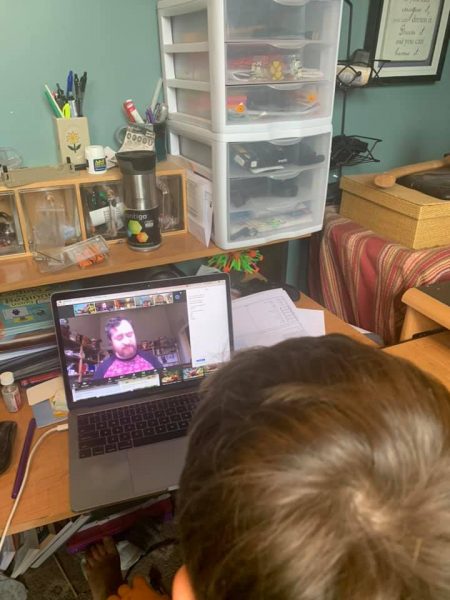 My son and I have been directly impacted by school closings because of public health concerns. When W.Va. Gov. Justice closed the public schools, Liz Hofreuter, the head of Wheeling Country Day School, decided to shut their doors as well. After just a one-day break, the kids and teachers were back together again on Zoom, a web-based video-conferencing application. I felt a rush of emotion when I heard all of their little voices on the first day of virtual third grade.
My son and I have been directly impacted by school closings because of public health concerns. When W.Va. Gov. Justice closed the public schools, Liz Hofreuter, the head of Wheeling Country Day School, decided to shut their doors as well. After just a one-day break, the kids and teachers were back together again on Zoom, a web-based video-conferencing application. I felt a rush of emotion when I heard all of their little voices on the first day of virtual third grade.
Although nothing can truly replace face-to-face instruction, the first week of online school has proven to be successful, and I anticipate it will become more so as teachers, students, and parents become more acquainted with the technology and rhythm of learning from home.
In fact, this unexpected experiment might yield insights into how to make online learning even better. As Hofreuter said in a recent email to parents on the day the school moved to remote learning, “We see this as an opportunity to differentiate and individualize learning in ways we have been researching and planning for some time.”
Like K-12 schools, colleges have had to grapple with how to make learning happen remotely. Most schools in our area, including West Liberty University, West Virginia Northern Community College and Bethany have extended their spring breaks to give professors time to prepare and then transfer all in-person classes to online. Wheeling University students were asked to vacate their residence halls, with course instruction to continue online.
Although some professors have had experience teaching in cyberspace, many have not. Most, however, have adapted quickly and have settled into a new way of being present with their students through synchronous video conferencing or chats and asynchronously through discussion boards and one-on-one office hours.
While many college students are struggling to find their place in this moment as both adults and not-quite adults, the demands on their time have increased with jobs and family responsibilities. Nonetheless, most students seem relieved to experience a semblance of normalcy in their lives as we move rapidly from life as we knew it to life in quarantine.
Online learning has allowed our students to continue their educations under incredibly challenging conditions. Rather than miss what is likely the entire last nine or so weeks of the school year, remote learning software and hardware make it possible for teachers to do what they do best: encourage, motivate and educate the next generation.
• Christina Fisanick, Ph.D., is an associate professor of English at California University of Pennsylvania, where she teaches expository writing, creative non-fiction and digital storytelling. She is the author of more than 30 books, including her most recent memoir, “The Optimistic Food Addict: Recovering from Binge Eating Disorder.” She has been a Weelunk contributing writer since 2015. Christina is a 1996 graduate of West Liberty University and a member of Ohio Valley Writers. She lives in Wheeling with her family.


